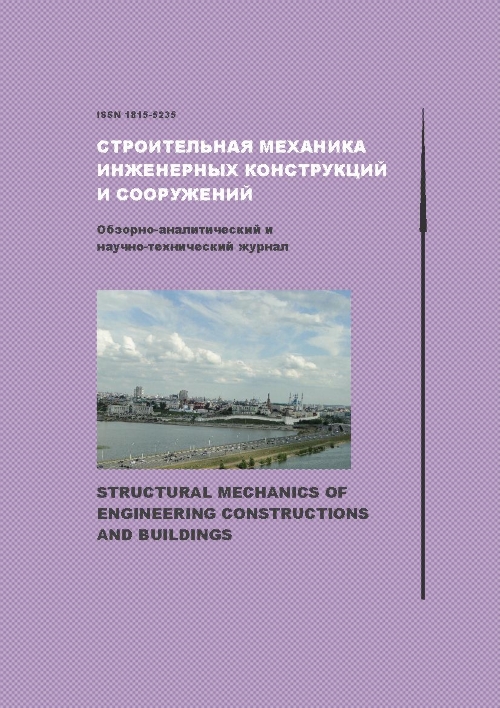No 3 (2013)
- Year: 2013
- Articles: 11
- URL: https://journals.rudn.ru/structural-mechanics/issue/view/675
Articles
REMOVAL OF THE FALSE TARGETS IN THE ISSUESOF SPATIAL TRIANGULATION BY PROJECTIVE GEOMETRY METHODS
Abstract
This paper deals with an issue of determination of the spatial coordinates within confined area in general terms. Mobile air space control stations were set and related to the system of spa- tial triangulation. As a result of the air space "scanning", targets appear in adequate representa- tion, representing identified aircrafts and other flying objects (FOs). The main objective is inter- pretation of collected data processing, in order to determine the reliable coordinates of an air- craft. The problem of false target identification occurs when data are analyzed from only two sta- tions. Descriptive Geometry method, for the construction of the planes containing rays targeted from the station towards the flying objects, in both classic-orthogonal projections and 3D model, as well, offers the solution of a problem. Dynamic 3D model consists of two flying objects, moni- tored from two stations in predefined time periods. The constructive 3D solutions represent geo- metrical locus of false targets trajectories, for several settings of flaying objects and monitoring stations. The analyses have shown geometrical positioning of the third station impact to the exact FO's coordinates determination. The geometrical solution could be the key for the development of numerical method, which will lead to applied software solution
Structural Mechanics of Engineering Constructions and Buildings. 2013;(3):3-13
 3-13
3-13


TRANSFORMATION OF THE SHELL EQUATIONS WHEN A VARIABLE CHANGES
Abstract
The questions of the transformation of equations of the shell theory are studied when it's necessary to change initial variables. This method was applied for a shallow shell in the form of right helicoid.
Structural Mechanics of Engineering Constructions and Buildings. 2013;(3):13-18
 13-18
13-18


THE CRACK NUCLEATION IN THE ISOTROPIC PLATE, WEAKENED BY A PERIODICAL SYSTEM OF CIRCULAR HOLES UNDER TRANSVERSE BENDING
Abstract
The mathematical description of model of crack nucleation in the thin plate weakened by periodic system of circular holes under transverse bending is given. The general representa- tions of solutions describing a class of problems with periodic distribution of stresses out-side of circular holes are obtained. The solution of a problem on crack nucleation is reduced to two infinite algebraic systems and two singular integrated equations of first kind
Structural Mechanics of Engineering Constructions and Buildings. 2013;(3):18-28
 18-28
18-28


THE PROBLEMS OF THE CREEP THEORY
Abstract
In this paper, an analysis of the patterns for creep theory of structural materials is realized and two important outstanding problems are revealed. The first problem consists in the use in the integral equation two or more numbers of instan- taneously strain diagrams of the materials. The twice problem appears in the use of inconsistent functions for presentation of the core. It reduces to results inconsistent with Newton's mechanics, that gets impossible applications Vol- terr's principle. There are models which solve indicated problems.
Structural Mechanics of Engineering Constructions and Buildings. 2013;(3):28-34
 28-34
28-34


 35-43
35-43


ANALYSIS RESEARCHES OF COMPENSATION PARTS OF STEEL-AND-REINFORCED CONCRETE PRESSURE HEAD CONDUITS, ARRANGED WITH APPLICATION OF THE LOW-MODULAR LAYING
Abstract
Iron-reinforce concrete pressure head turbine conduits traditional now have the so-called compensation sites arranged in places of transition from a body of a concrete dam in the building of hydroelectric power station with application of low-modular ("soft") laying, completely separating an internal steel cover from surrounding reinforced concrete.<неиResults of settlement researches (on the basis of finite elements models) of stress-strain state of compensation sites of pressure head conduits are presented at various variable parameters for the purpose of justification of need of installation of settlement working reinforcing instead of constructive reinforcing.
Structural Mechanics of Engineering Constructions and Buildings. 2013;(3):43-49
 43-49
43-49


 50-56
50-56


CONSTRUCTION OF A TRIANGULAR FINITE ELEMENT FOR THIN SHELL CALCULATION ON THE BASE OF THE LIMIT SCHEME OF FINITE ELEMENT ANALYSIS
Abstract
A flat triangular finite element is proposed for thin shells, in which the approximations of membrane and bending deformations are implemented with help of the limit tractability of finite element analysis. Increasing the degree of coincidence between the rotation angles of finite elements is achieved with the penalty functions. The high accuracy of this discretization scheme is illustrated on the samples of cylindrical panel and shell in the form of a hypar.
Structural Mechanics of Engineering Constructions and Buildings. 2013;(3):57-63
 57-63
57-63


MORE ACCURATE DEFINITION OF REAL PHYSICAL-AND-MECHANICAL CHARACTERISTICS OF GROUND FORMING THE BASIS OF THE WATER CONTAINER OF ZAGORSK HYDRO ELECTRIC STATION-2 ON THE BASE OF ANALYTICAL INVESTIGATIONS AND DATA OF NATURAL CONTROL
Abstract
Results of settlement definition of the actual physic-mechanical characteristics of the basis of a water intake on the basis of finite element models of system "a water intake under construction - the basis" with use of this natural supervision over a precipitation of a water intake under con- struction are given. Thus researches were conducted for the various stages of construction corre- sponding to cycles of geodetic supervision.
Structural Mechanics of Engineering Constructions and Buildings. 2013;(3):64-71
 64-71
64-71


TOTAL STATION EQUIPPEDWITH A BUILT-IN CRACK SCALE
Abstract
This paper describes KUMONOS, which is a total station equipped with a built-in crack scale. Using this system enables one to accurately measure the width of cracks in structures from a distance. When compared to the traditional inspections based on hand-sketches, the advantages of the inspections using KUMONOS are high precision, safety and economic performance. Therefore, KUMONOS can be expected to perform a constructive role in maintaining structures.
Structural Mechanics of Engineering Constructions and Buildings. 2013;(3):72-77
 72-77
72-77


 77-80
77-80
















